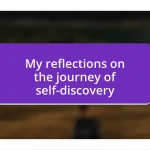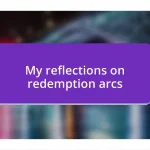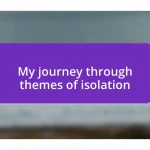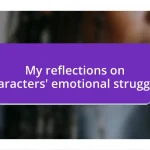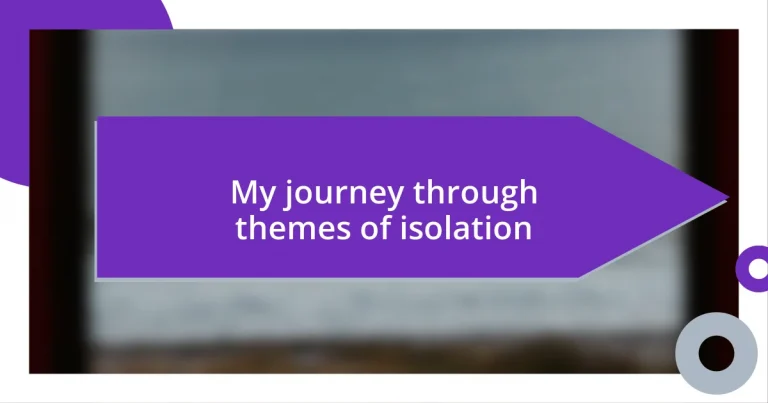Key takeaways:
- Isolation can stem from life transitions, mental health struggles, and societal pressures, highlighting the importance of recognizing its subtle signs.
- Building a support network through vulnerability and shared experiences can significantly alleviate feelings of isolation and foster genuine connections.
- Finding purpose during isolation through creative outlets like painting and writing can lead to self-discovery and empowerment, ultimately transforming loneliness into meaningful personal growth.
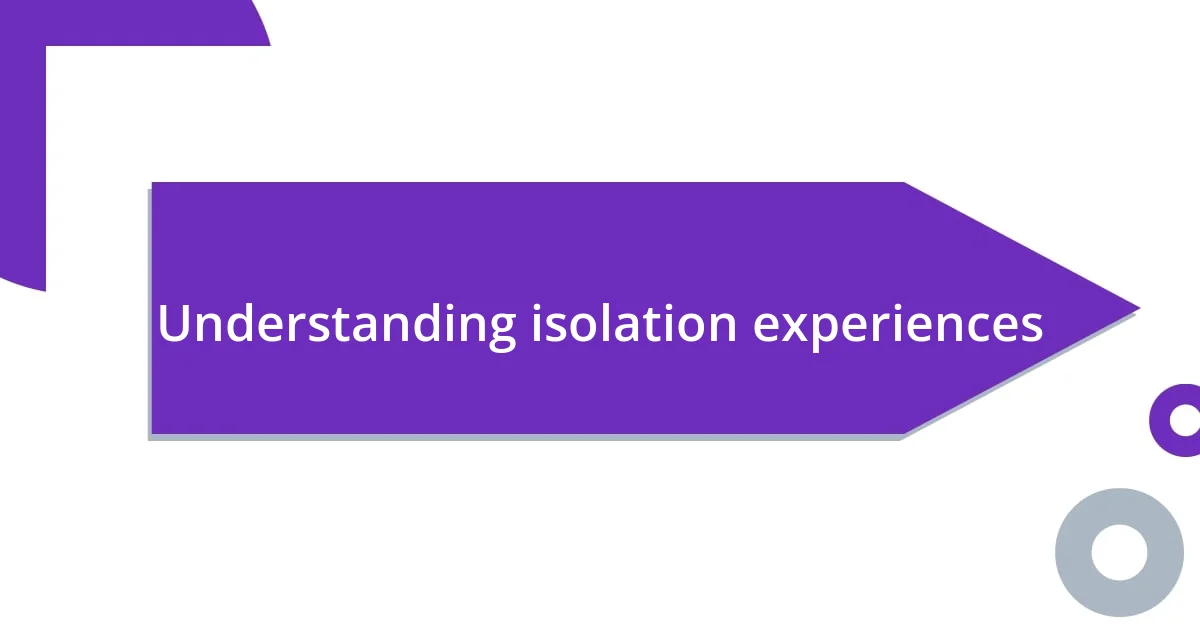
Understanding isolation experiences
Isolation can feel like a heavy blanket draped over us, tightening around moments that should be filled with connection. I remember sitting alone in my room during a particularly challenging time, feeling as if the world outside my window was a different reality. How often do we find ourselves longing for interaction but too afraid to reach out?
The emotional landscape of isolation is complex; it can lead to deep introspection or an overwhelming sense of loneliness. There were nights when I found solace in journaling, pouring my thoughts onto paper, but I sometimes wondered: does this truly fill the void? Engaging with my own feelings helped, yet the absence of another voice often left echoes of doubt in my mind.
For many, including myself, these experiences can reveal surprising truths about our relationships. It makes me reflect on how we often take connections for granted until they fade away. Have you ever felt like your closest friends were miles away, even when they were just a text away? That yearning for connection can surface profound realizations about what we value most in our lives.
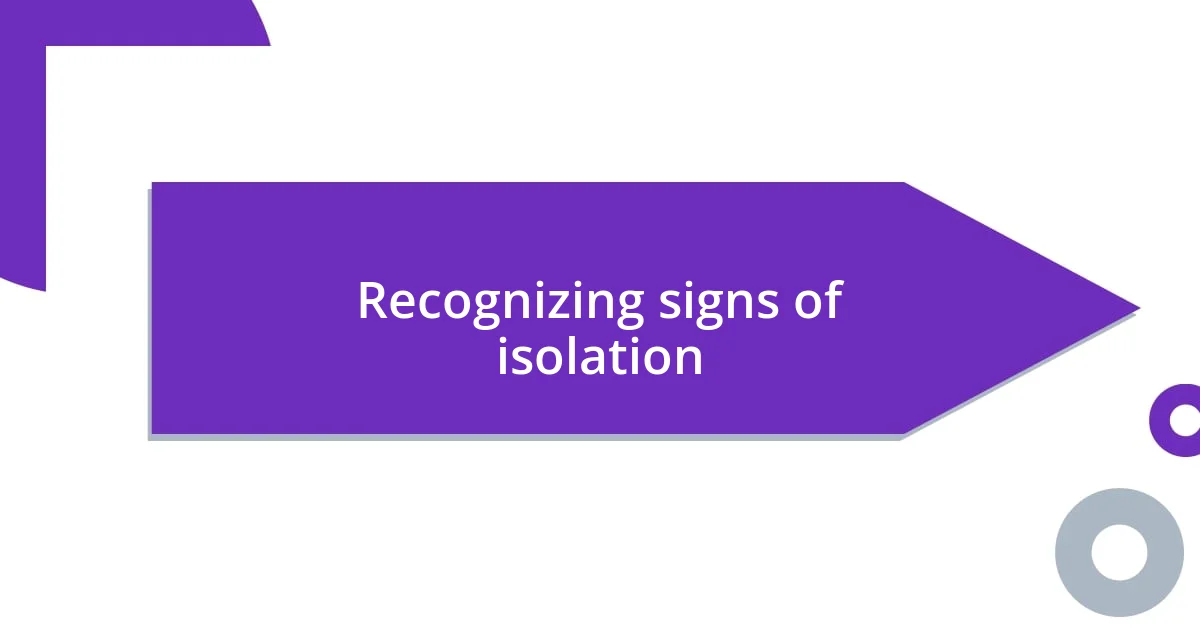
Recognizing signs of isolation
Recognizing signs of isolation can sometimes be challenging, as they often manifest subtly. I remember feeling increasingly withdrawn at social gatherings, smiling superficially while feeling disconnected inside. It wasn’t just about being physically alone; it was a gnawing feeling that something was missing.
Here are some signs that may indicate someone is experiencing isolation:
- A noticeable drop in communication with friends and family
- Increased time spent alone or in solitude
- Experiencing feelings of loneliness, even in a crowd
- Reduced interest in activities once enjoyed
- Difficulty expressing thoughts or feelings to others
- Changes in sleeping or eating patterns
- Feeling overly sensitive or easily overwhelmed by social interactions
It’s important to pay attention, both for ourselves and those around us, as recognizing these signs can be the first step toward addressing the underlying feelings.
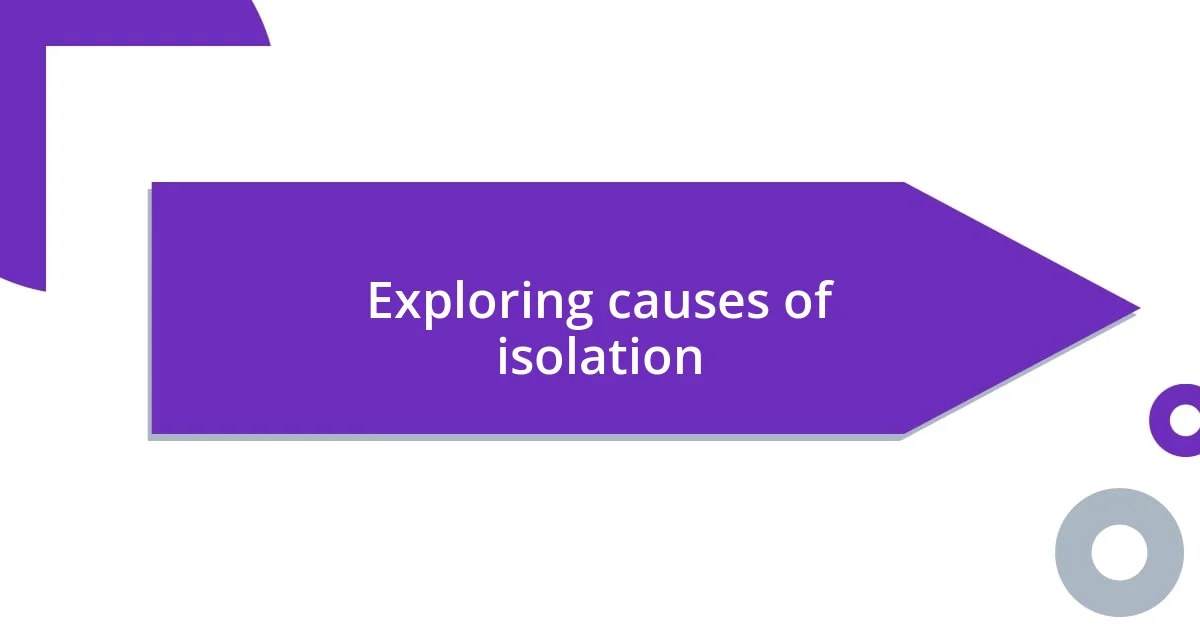
Exploring causes of isolation
When I delve into the causes of isolation, I often think about the powerful role of life transitions. For instance, moving to a new city can be exhilarating, but it can also trigger a profound sense of loneliness. I remember the first few weeks after my big move; the excitement quickly faded into a silence that felt deafening. It’s like being surrounded by people but feeling completely invisible.
Another significant cause of isolation is mental health struggles. Those moments when anxiety or depression enveloped me, making even the thought of socializing seem exhausting, resonate deeply. I sometimes wonder how many people silently battle their inner demons, yearning for connection yet feeling paralyzed by their condition. It’s essential to understand that these feelings don’t define our worth or our ability to reconnect.
Lastly, societal pressures can create barriers to connection. I’ve often felt the weight of expectations—whether in work, relationships, or even social media—that sometimes pushes me further into solitude. It raises an interesting question: Have you ever felt like you had to wear a mask to fit in, isolating the true essence of who you are from those around you? That divide can create an overwhelming sense of separation, making it vital to seek genuine engagement with others.
| Cause of Isolation | Description |
|---|---|
| Life Transitions | Major changes, like moving to a new city, can spark feelings of loneliness despite being in new environments. |
| Mental Health Struggles | Anxiety and depression can lead individuals to withdraw from social interactions, feeling trapped in their own thoughts. |
| Societal Pressures | External expectations can create a sense of disconnect, making individuals feel they must maintain a facade to belong. |
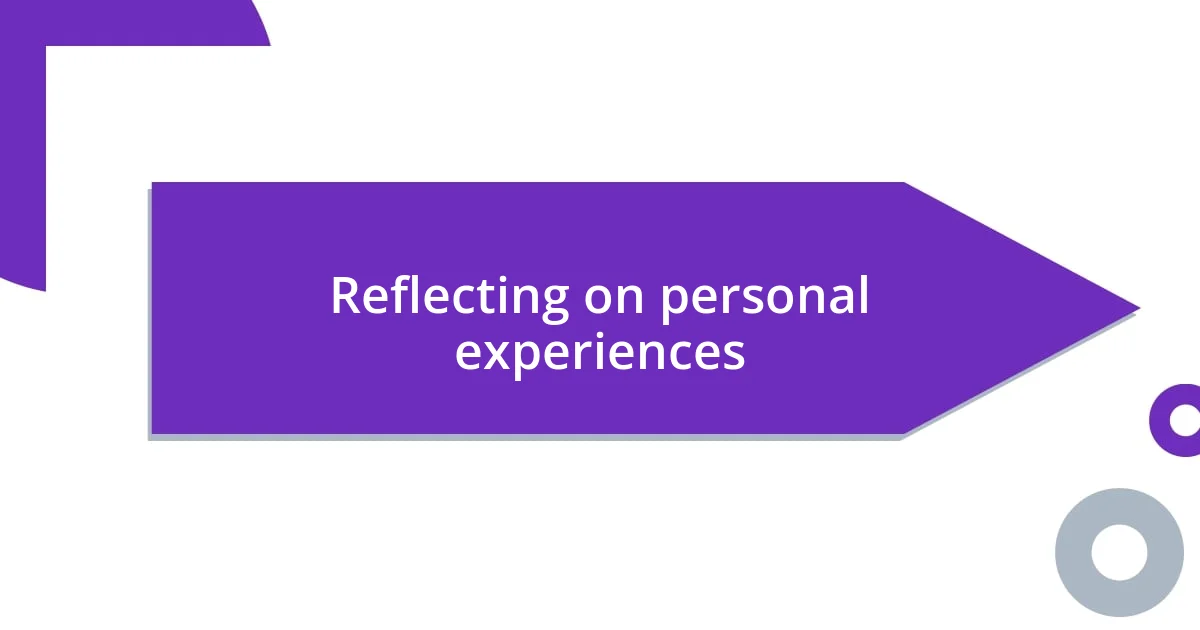
Reflecting on personal experiences
Reflecting on personal experiences, I find that moments of isolation often creep in during our busiest times. Once, I was juggling multiple projects at work, feeling overwhelmed while surrounded by colleagues. I vividly remember those late nights when I was physically present but emotionally absent, as if a glass wall separated me from everyone else. How many of you have felt that strange paradox of being with others yet feeling utterly alone?
It’s funny how isolation can morph from a brief moment into a prolonged state. I recall a summer where I chose to isolate myself after a small group of friends drifted away. Initially, it felt like a conscious choice—freeing, even. But as days turned into weeks, I realized that solitude had transformed into loneliness, filling my days with silence that echoed. Have you ever noticed how silence can sometimes feel more isolating than chaos?
Looking back, I see how my struggle with isolation wasn’t just situational; it was often a mirror reflecting my internal battles. I remember sitting in my room, surrounded by social media posts showcasing gatherings I wasn’t part of, feeling a sting of jealousy mixed with self-doubt. It made me ponder: Is the distance we feel more about our perception rather than the reality of our connections? Finding ways to bridge that perceived gap has been a journey, and I’m learning that reaching out—no matter how daunting—can be a first step toward breaking through isolation.
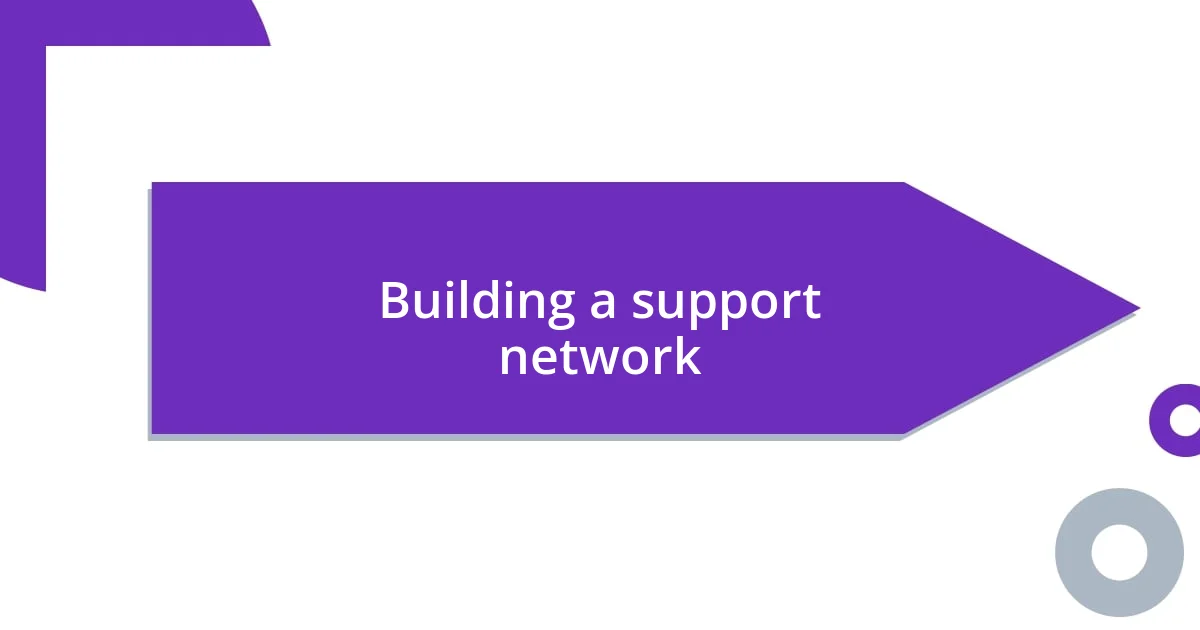
Building a support network
Understanding the importance of a support network became evident to me after a particularly difficult period in my life. I remember when I was navigating a challenging job transition. At first, I kept my struggles to myself, thinking reaching out was a sign of weakness. But when I finally decided to connect with old friends and share my experiences, I was met with empathy and encouragement. It was a powerful reminder that vulnerability often paves the way for authentic connection.
Building a support network is not just about finding people to talk to; it’s about creating a safe space where you can express your feelings without judgment. I recall a coffee chat with a colleague who had faced similar challenges. As we discussed our fears and frustrations, it felt as if a weight had been lifted. Sharing our vulnerabilities bonded us and created an environment where isolation felt less daunting. Have you ever shared a deep secret only to realize you weren’t alone in your struggles?
In my experience, actively nurturing relationships has been key to feeling less isolated. I started attending local meetups and engaging in community activities, which opened doors to new friendships. I vividly remember joining a book club, where discussing novels led to sharing life stories. It was through these interactions that I learned the profound impact of mutual support. How often do we underestimate the power of a simple conversation? Taking those small steps not only helped me build connections but transformed my perspective on belonging.
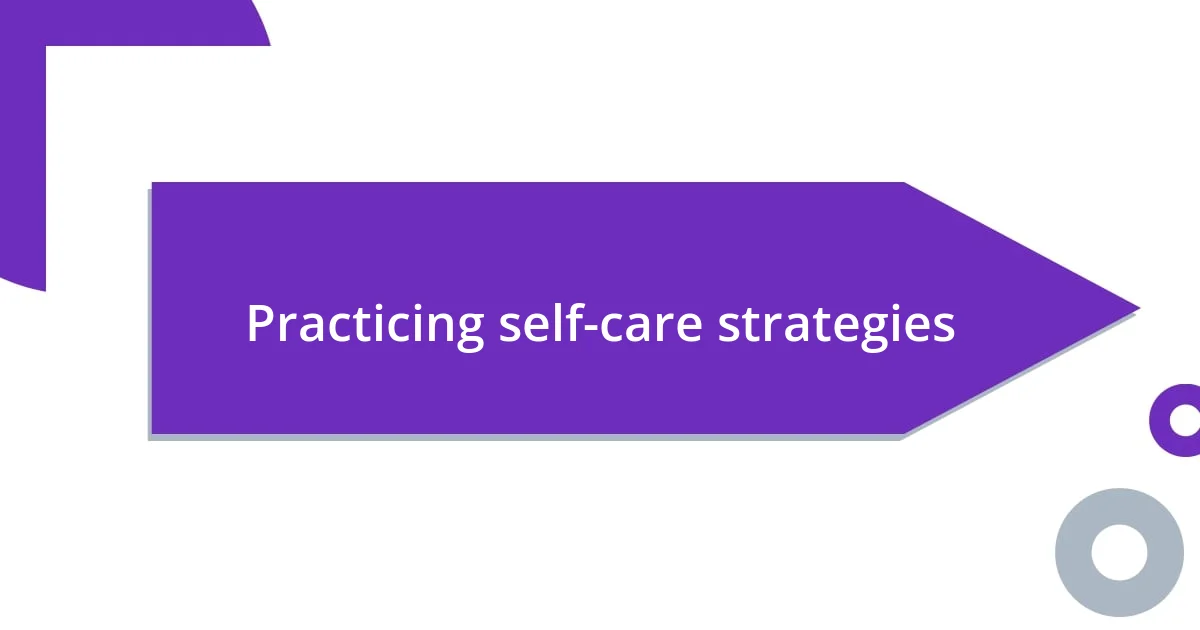
Practicing self-care strategies
Practicing self-care strategies has been a game changer in my journey through isolation. I remember a time when I felt completely drained from work and social obligations. One evening, I decided to turn off my phone, brew a comforting cup of tea, and lose myself in a good book. That simple act of disconnecting and indulging in my own needs felt revitalizing, almost like a warm hug for my soul. Have you ever experienced a moment where you realized that stepping back could lead you to reconnect with yourself?
I’ve also discovered the power of creating a structured routine that includes self-care rituals. For instance, I began setting aside Sunday afternoons for mindfulness exercises, where I practice meditation or journaling about my thoughts and feelings. During one particularly intense session, I was overwhelmed with memories of my isolation, but as I wrote them down, it was as if I was releasing the weight of those thoughts. Isn’t it fascinating how putting pen to paper can help you process emotions you didn’t even know were there?
Lastly, I’ve found that physical activity is an essential part of my self-care strategy. Whether it’s going for a brisk walk in nature or trying out new workout classes, moving my body has become a therapeutic escape. One day, after an especially isolating week, I pushed myself to join a dance class. While I was initially hesitant, the joy of losing myself in the music and movement reminded me of the connection among all humans sharing that space. Don’t you think that sometimes, a little rhythm can break down our walls?
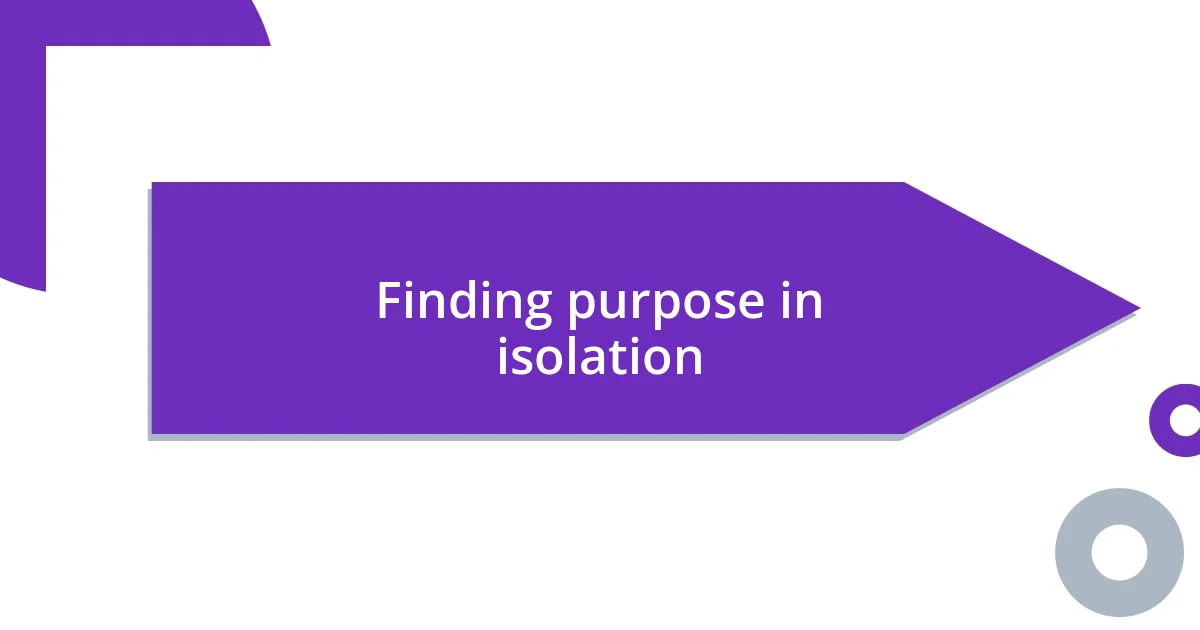
Finding purpose in isolation
Finding purpose in isolation often requires introspection and a willingness to explore what truly matters to us. I once had a summer where my days stretched out in solitude, and I decided to start a personal project: painting. With my canvases set up in the corner of my living room, I poured my emotions onto the canvas. It became clear to me that this creative outlet was not just a way to pass the time, but a profound journey toward self-discovery. Have you ever lost track of time while engaging in something you love? That’s how I began to see isolation as a space for artistic exploration rather than emptiness.
As I navigated through those moments alone, I found that writing became my anchor. I began journaling to capture thoughts and emotions, which often felt overwhelming. One day, after pouring my heart out on the page about my fear of loneliness, I stumbled upon a thread of hope. I realized I could turn my pain into stories that resonate, allowing others to see their experiences reflected in my words. It was empowering to understand that every feeling I documented served a purpose, connecting me to a larger narrative. How powerful is it to think our struggles can help someone else feel seen?
Additionally, I recognized that giving back during times of isolation can shape our sense of purpose. Volunteering at a local shelter opened my eyes to the interconnectedness of our lives. One day, while serving meals, I met a young woman who reminded me of my past self—searching for direction and belonging. In sharing our stories, I realized that my journey through isolation had prepared me to support others on their paths. Doesn’t it seem that, in giving, we often receive even more in return?





